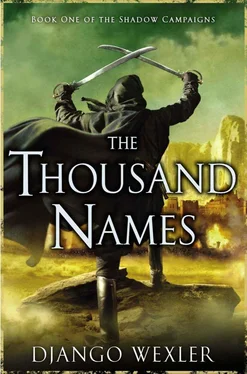Django Wexler - The Thousand Names
Здесь есть возможность читать онлайн «Django Wexler - The Thousand Names» весь текст электронной книги совершенно бесплатно (целиком полную версию без сокращений). В некоторых случаях можно слушать аудио, скачать через торрент в формате fb2 и присутствует краткое содержание. Жанр: Фэнтези, на английском языке. Описание произведения, (предисловие) а так же отзывы посетителей доступны на портале библиотеки ЛибКат.
- Название:The Thousand Names
- Автор:
- Жанр:
- Год:неизвестен
- ISBN:нет данных
- Рейтинг книги:4 / 5. Голосов: 1
-
Избранное:Добавить в избранное
- Отзывы:
-
Ваша оценка:
- 80
- 1
- 2
- 3
- 4
- 5
The Thousand Names: краткое содержание, описание и аннотация
Предлагаем к чтению аннотацию, описание, краткое содержание или предисловие (зависит от того, что написал сам автор книги «The Thousand Names»). Если вы не нашли необходимую информацию о книге — напишите в комментариях, мы постараемся отыскать её.
The Thousand Names — читать онлайн бесплатно полную книгу (весь текст) целиком
Ниже представлен текст книги, разбитый по страницам. Система сохранения места последней прочитанной страницы, позволяет с удобством читать онлайн бесплатно книгу «The Thousand Names», без необходимости каждый раз заново искать на чём Вы остановились. Поставьте закладку, и сможете в любой момент перейти на страницу, на которой закончили чтение.
Интервал:
Закладка:
“Could be, sir,” Graff said.
“Let’s assume not.”
Winter looked up at the boat Folsom had dragged into place. There was room for only eight or nine men to stand across the quay, shoulder to shoulder. That wasn’t a lot of fire, even with a good supply of loaded weapons. On the other hand, the enemy would be similarly restricted, and they wouldn’t have anything to hide behind.
“If they come, they’re going to get a kicking,” Graff said, echoing her thoughts. “I wouldn’t like to try attacking up this way.”
“Let’s hope they’ll be just as reluctant.”
• • •
As it turned out, they were not.
It was a further half an hour before the enemy commander decided the village was clear and marched his men in. All four companies, or what was left of them, formed up in the town square. They were three or four hundred yards from the edge of the quay, and twenty more from the barricade. Close enough for the Vordanai to shout and make insulting hand gestures, but too far for anything but an extremely lucky shot to carry.
There was one man ahorse just in front of the enemy ranks, who Winter assumed was the commanding officer. She hoped he’d display the same lead-from-the-front mentality that his lieutenant had shown earlier, but no such luck. When the brown-and-tan column lurched into motion, the mounted man stayed well to the rear. Winter signaled for her own men to make ready. Nine of them, chosen by general acclamation to be the best shots in the company, were crouching against the barricade. The rest of the rankers waited nervously behind them, spread out across the quay, sitting or on their knees to avoid showing their heads over the top of the boat.
The Auxiliaries were in a company column, forty men wide and a dozen or so deep. Their drummers quickened the pace as they approached, from the languid march rhythm to the pulse-fast beat of the attack. Winter’s men waited, bayonets already fixed on their muskets, until the column was a hundred yards out-still well away from the base of the quay but clear of the last few houses in the village.
At a gesture from Winter, the men on the barricade opened fire. The crash of nine muskets at once, in the echoing confines of the boat-crowded quay, sounded more like a battalion volley. Smoke billowed along the barricade, and here and there in the front rank of the approaching formation men twitched and went down, or dropped out of line and stumbled off to the sides. A hundred yards was still a long shot for a musket, but the target was wide and packed shoulder to shoulder, so some balls inevitably struck home.
As soon as they’d fired, the men on the barricade turned and handed their weapons to soldiers waiting behind them, accepting fresh ones in return. Winter watched the exchange with a touch of pride. For something she’d improvised on the spot, they handled it nicely. Another volley crashed out, more ragged than the first as the individual men fired as quickly as they could mark a target. More Auxiliaries went down. The brown-and-tan column closed up around the casualties, its ranks swallowing the fallen like some amorphous multibodied creature. Winter could hear the shouts of the Khandarai sergeants pushing their men to keep the line straight in spite of the losses.
Another volley, and another, until all cohesion was lost and there was simply a steady rattle of shots. New muskets were handed up as quickly as they were fired, while the balance of the company worked on reloading. The tread of the Auxiliaries’ boots was audible under the intermittent cracks of the shots and the fast beat of the drums. Winter watched the remorseless advance of the column with rising dread.
Come on, she thought at them. You don’t like this, do you? Break off-
The drums stopped, and then the footsteps.
“Down!” Winter shouted.
A moment later, the first two ranks of the column cut loose. The roar of musketry drowned the sound of the balls striking the boat, but Winter could feel the barricade shiver and jump under the impact. More shots zipped and whistled overhead.
“Fire!” she called, and the men who’d ducked behind their makeshift breastwork popped back up and continued their withering barrage. At fifty yards, nearly every ball told. The few that didn’t hit the dirt in front of the Auxiliaries, throwing up little fountains of mud.
Another volley from the Khandarai made the boat shake and splinter. Once again, the Vordanai ducked, which rendered the shots mostly ineffective. The Auxiliaries’ fire-discipline was breaking under the stress and excitement of battle, as it always did once soldiers were hotly engaged. The next volley was ragged, with shots continuing to sound a considerable time after the main blast, and from that point on the shooting dissolved into a general racket on both sides as men fired, loaded, and fired again as fast as they were able.
One of Winter’s nine leapt back from the barricade, cursing and clutching the bloody mess of his left hand. Graff gestured and one of the loaders took his place, taking up the fallen musket and firing into the gathering smoke. It was becoming difficult to see, but judging from the pinkish yellow muzzle flashes the Auxiliaries were still out at fifty yards, some distance from the base of the quay.
Winter could well imagine their commander’s consternation. Only his first two ranks could fire, but that still gave him eighty muskets engaged to her nine. On the other hand, Winter’s men were getting off three or four shots for every one the Khandarai loosed, and they were protected by the barricade.
Moreover, he had few options for rectifying the situation. The closer he got to the quay, the more the barges lining the sides would restrict his visibility, until he was reduced to the same nine-man front. The only other option was to charge and hope to carry the barricade with bayonets, but the tactics manual said that a bayonet charge would be effective only against an enemy already shaken or routed by fire, and the defenders here were clearly anything but shaken.
Winter hoped like hell the man stuck to the tactics manual. The Auxiliaries had plenty of bodies in the rear ranks to replace those that fell, she knew, but how long would they stand it? No matter how well trained, there was a limit, and no soldier liked to stand in a position where he was obviously getting the worst of it.
One of the men in blue flopped backward from the barricade, thrashing on the quay like a landed fish. Winter glanced in his direction and then looked away with a shudder; the ball had carried away a quarter of his skull, and he’d splashed the stones with blood and bits of slime when he fell. Graff sent another man up the barricade and detailed two more to drag the dead man to the rear and out of view.
She turned back to the battle, only to find it dying away at last. Either panic had triumphed over discipline or the enemy commander had recognized the futility of his position and backed away voluntarily. Whatever the case, there were no more muzzle flashes in the smoke, and no skirl of advancing drums. The men on the barricade fired a few more shots on general principle, then let out a cheer to hurry the Khandarai on their way.
It wasn’t until the cheering became general that Winter noticed that one of the soldiers leaning on the boat wasn’t joining in. She had a couple of men pull him away, and they found he’d taken a ball in the chest and died in place, painting the woodwork red with gouts of arterial blood. In the confusion of battle, no one had noticed.
That dampened the atmosphere somewhat. Winter stared out into the swirling smoke while Graff conducted the poor dead boy to the end of the pier. Her apprehension increased by degrees, until by the time he returned she was certain something was wrong.
Читать дальшеИнтервал:
Закладка:
Похожие книги на «The Thousand Names»
Представляем Вашему вниманию похожие книги на «The Thousand Names» списком для выбора. Мы отобрали схожую по названию и смыслу литературу в надежде предоставить читателям больше вариантов отыскать новые, интересные, ещё непрочитанные произведения.
Обсуждение, отзывы о книге «The Thousand Names» и просто собственные мнения читателей. Оставьте ваши комментарии, напишите, что Вы думаете о произведении, его смысле или главных героях. Укажите что конкретно понравилось, а что нет, и почему Вы так считаете.











